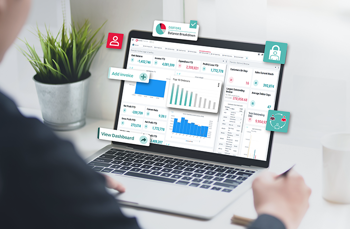Choosing the right accounting software for your business
Keeping finance systems up-to-date should be a priority for every business – not only because it helps to ensure that efficiency is maintained, it also provides the very best foundation for future growth.
Are trying to choose a new accounting system for your business? In this article, we explain how to choose accounting software that’s going to help drive your business forward and deliver optimum efficiency and reliability for finance teams.
We include a full guide on how to choose and switch your accounting software for you to download and save.
Information on this page
What is accounting software and why is it important?
One of the most important tasks of a finance lead is to set goals for the organisation which are backed up by rigorous data. Financial management software makes use of that data and provides the analysis that finance managers need to make the best decisions for your business.
Accounting software that collects up-to-date data from across the organisation is imperative to avoid making poor decisions with disastrous consequences for the balance sheet in the long-term. This is why it should be a fully capable system.
Good software automates repetitive processes, freeing up time to think strategically and carefully. Without it, finance leaders are unable to properly monitor what staff are doing in an industry where overruns can be costly.
What does good accounting software look like?
Whereas typical finance work involves a host of difficult, time consuming and inefficient tasks that need to be completed regularly, modern financial software packages make this much easier by automating many jobs and freeing-up staff to carry out more value-adding activities instead.
Of course, effectiveness goes beyond simply picking up jobs that humans could do and automating them. It can also change the mindset of employees, and make them more likely to engage with the tool.
Good accounting software
- Finance leads can monitor their teams' project progress accurately
- Analytics are automated and information is clear
- Automated report generation for month-end, with real-time data available
- No need for manual rekeying
- Automated processes reduce opportunity for human error, and flag if an error is found
- Automatic software upgrades means Australian and New Zealand compliance laws are always adhered to
- No more manual repetitive standard processes
Bad accounting software
- Project costs overrun and it's difficult to see why
- Data visibility is poor
- Reporting is time-consuming
- Accounting processes rely heavily on rekeying
- Human-error occurs regularly and is difficult to spot
- Compliance requires significant human intervention
- Standard processes are not automated
- Data is kept on multiple systems that are not integrated - no single source of truth
Our accounting software is rich in functionality and brings together all your accounting and financial operations in one place.
4 key features to look for when choosing your new accounting system
1. How does it collect data?
The ideal accounting system has a centralised data dashboard that accurately captures what is happening across all strands and systems within the business and presents it in a readable, precise manner.
2. What level of automation is included?
Accounting involves a stream of repetitive tasks. From manually adding in the minutiae of payroll information to ensuring that regular supplier payments are made, there is plenty of room for error. As many functions as possible is a proven way to reduce the risk. Some can even automate monitoring tasks, such as ensuring that budgets are not exceeded on specific projects, or that balance sheet goals and targets are being met.
3. Is it compliant with current and upcoming regulations?
Your accounting software should, for example, be able to send your BAS information seamlessly and without error to the ATO. It should also be able to comply with current compliance regulations in Australia or New Zealand.
4. What tools are included that aid strategic decision-making?
Budget forecaster tools are ideal for monitoring company spending and producing rich data that can be used to feed into spending decisions. Likewise, data harmonisation functionality is a great way to support and balance differing viewpoints, verify data, and avoid taking a siloed perspective. These tools should be a key part of robust reporting your finance system offers.
What accounting system is best for your business?
Choosing the right accounting software for your business greatly comes down to your essential requirements and key challenges. For example, you may currently be using old, outdated accounting software which is clunky and slow and could be a high security risk and cause data inaccuracies.
It might be that your team needs a smarter and faster finance management system, and/or a broader set of features and more advanced functionality to simplify complex finance and accounting tasks. Automated accounts payable, project accounting and fixed asset accounting are key examples of more advanced solutions that can help businesses and finance teams to work more efficiently.
Many finance teams also see the benefit of upgrading to a solution that can be integrated with other software (such as HR and payroll systems) on one simplified platform.
So how do you choose the right accounting software? Here's 6 steps...
1. Research
Before anything else, you must set aside time to research the product that you think will be the best accounting system for your business and understand the positive impact it can have for your accounting practices. Consider what challenges you currently face with your existing software and what solutions could help resolve these.
2. Plan ahead
Make sure you make your switching plan, a simple, easy to follow guide of key considerations for each stage of the switch and that every step ties in with the objectives of your business.
3. Consider bolt-ons
Depending on what accounting system is best for your business, it’s also likely you’ll need extra modules like project accounting or Microsoft integration if you use Microsoft for your all-round business needs. Any good accounting software provider will offer a suite of modules to meet your needs.
4. Factor in time and investment
It’s important that the accounting system you are switching to, is going to be with you for the long-run, especially if you plan to scale up your business. Investing and taking time at the implementation stage to ensure finance teams have had the right training and understand how to get the most from their new accounting system, is vital.
5. Make sure your data is up to date
For many businesses investing in a new accounting system is part of a digital strategy to better harness data. But your system is only as good as the data that’s fed into it. It’s so important to ensure data across your business from finance, to HR, to sales and marketing, is accurate and up-to-date so your new system can provide accurate insights.
6. Choose the right provider
Finally, it's important to choose the right financial management software provider as they can make the switch quick, efficient and with minimal disruption to the day-to-day operations of any finance team.
Download Choosing Accounting Software Guide
For more in-depth information, download our guide on how to choose and switch your accounting software. It includes handy templates to help you manage your switching project.
How our accounting software could help you
Access Financials offers an integrated accounting solution helping to achieve strong financial, operational and project control, which have supported over thousands of businesses to scale their finance and accounting activities and drive business continuity.
We are experts in finding the right software for small to medium sized businesses and provide dedicated customer support to help our users get the most from their software throughout their journey with us.
Get in touch to discuss your accounting software requirements, or book a free demo of our financial software suite to explore the features.
Want to know more?
Have a read through more accounting software information, guidance and advice.

What is accounting software?
What is accounting software
How does accounting software work?
How does accounting software work
How to implement accounting software
How to implement a new accounting system
How much does accounting software cost?
Accounting software cost

 UK
UK
 SG
SG
 MY
MY
 US
US
 IE
IE